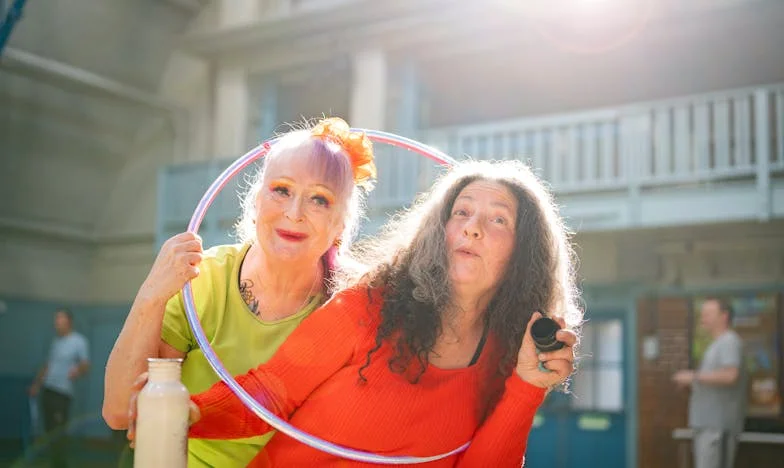A House Divided: My Life as a Stepmother in Suburban Ohio
“I’m not invisible, am I?” The words tumbled out of my mouth before I could stop them, echoing in the kitchen, bouncing off the fridge covered in Eva’s kids’ crayon drawings. My husband, Tom, looked up from his coffee, momentarily startled. Saturday mornings in our house in suburban Ohio were a ritual of chaos—a tornado of squealing grandkids, the clatter of cereal bowls, and Eva’s voice, always a little too loud, always a little too pointed, especially when it came to me.
“Mary, did you want something?” Eva’s face was polite, but her eyes flickered with impatience. She never called me ‘Mom,’ not even after seven years. I forced a smile, my hands tightening around the dish towel.
“Nothing. Just… wondering if anyone needed more juice.”
Tom tried for normalcy, grunting, “We’re good, hon.” He was always caught in the crossfire, torn between the daughter he’d raised alone after his first wife died and the wife he’d married later in life. I could feel him willing me to just let it go, to be the bigger person, to not ruin another Saturday.
I turned away so no one would see the tears pricking my eyes. I could remember when Tom and I first met—a chance encounter at the library, our laughter echoing between the stacks. He made me feel seen. Wanted. Safe. But after we married, every Saturday, our home transformed into a place where I felt like a guest in my own life.
Eva’s kids—Madison and Tyler—were sweet in their own way, but even they knew the rules. Grandma Linda’s photo still hung in the hallway, eyes gentle, smile kind. Whenever Madison scraped her knee or Tyler threw a tantrum, they’d run to Eva. Not me. I was a ghost floating between rooms, offering snacks, wiping spills, never invited into the real moments.
Last Thanksgiving, Eva had arrived early, arms full of groceries. “I’ll handle the stuffing, Mary. It’s Dad’s favorite the way Mom made it.” Her voice had a razor’s edge, and I’d retreated to the living room, listening to them laugh and reminisce. Tom hadn’t noticed my absence, too busy basking in the glow of his old life returning.
I’d tried, God, I’d tried. PTA meetings. Soccer games. Birthday parties. I bought gifts and baked cakes. But every gesture felt like trespassing. Eva would say thank you, but her thanks felt like a closed door. Sometimes, after everyone left, I’d sit on the porch, wine glass trembling in my hand, and ask myself why I kept trying.
Tonight, after the usual Saturday storm, Tom found me folding laundry in our bedroom, my movements stiff. He sat beside me. “You okay?”
I wanted to scream. Instead, I whispered, “I don’t think Eva likes me. I don’t think she ever will.”
His sigh was heavy. “She’s just… protective of the past. It’s not about you.”
“But it is about me, Tom,” I said, voice cracking. “I’m here. I’m not her mother, but I’m your wife. I deserve to feel like I belong in my own house.”
He took my hand, weathered and warm. “You do belong here. I’m sorry if I don’t show it enough.”
But his words were just that—words. The next Saturday, Eva arrived, and the same dance began. She rearranged the living room, criticized my casserole, laughed with Tom about memories I’d never shared. The ache in my chest grew heavier.
One afternoon, after a tense meal, Eva lingered in the kitchen. The kids were outside, Tom napping in the den. She fiddled with the faucet, not meeting my gaze. The silence stretched. Finally, she spoke, “You know, it’s hard for me, too.”
I blinked. “What is?”
She shrugged, her voice softer than I’d ever heard it. “Coming here. Seeing Dad with someone else. Missing Mom. I know you try. I just… I feel like I’m betraying her by letting you in.”
I swallowed hard, my own bitterness melting into something like understanding. “I’m not trying to replace her, Eva. I just want a place in this family. Not as your mom. Just… as Mary.”
She looked at me then, really looked, and for the first time I saw not my enemy, but a woman grieving, just like me. We stood there, awkward and raw, two women bound by love for the same man and the same children.
The weeks that followed weren’t magical. Eva still bristled. Tom still avoided the tough conversations. Madison still called me ‘Mary.’ But there were moments—a shared joke, a quiet cup of coffee in the kitchen, a thank you that sounded a little less forced. I clung to those moments, hopeful.
Some nights, I still lie awake, wondering if I’ll ever truly belong. If I’ll ever be more than the woman who married their dad. But I think of Eva’s words, the glimmer of connection, and I realize that maybe belonging isn’t something you’re given. Maybe it’s something you build, brick by uneasy brick.
And I ask myself: How many families out there are quietly fighting the same battle? How many stepmothers, stepfathers, children, are all just trying to find a place at the table? When did home become something we have to fight for, instead of something we share?
